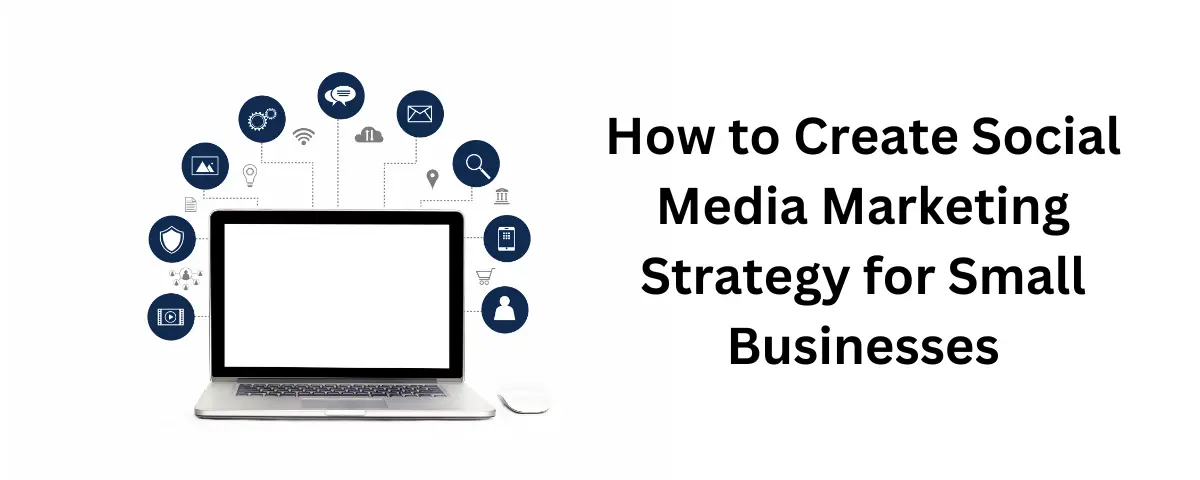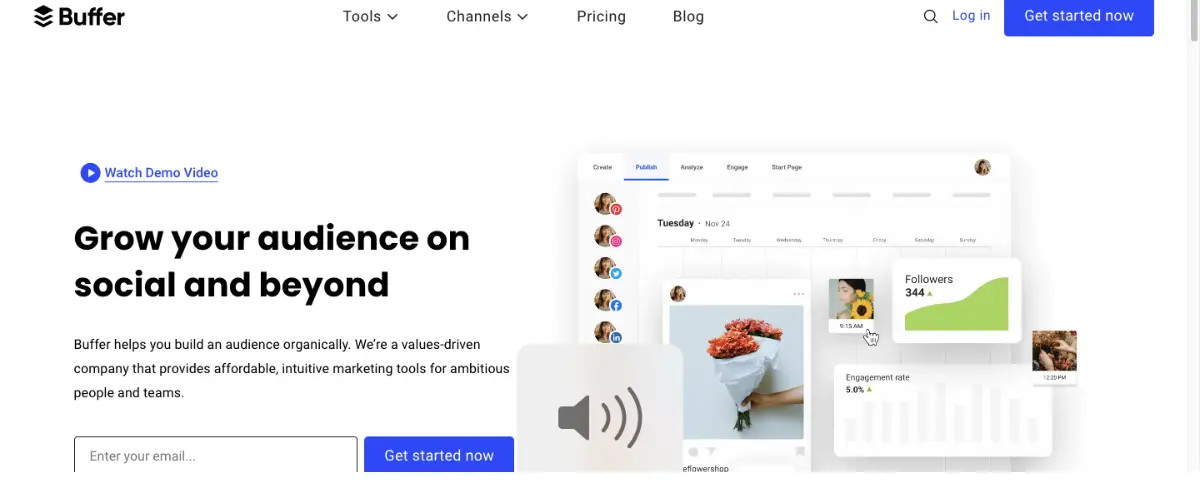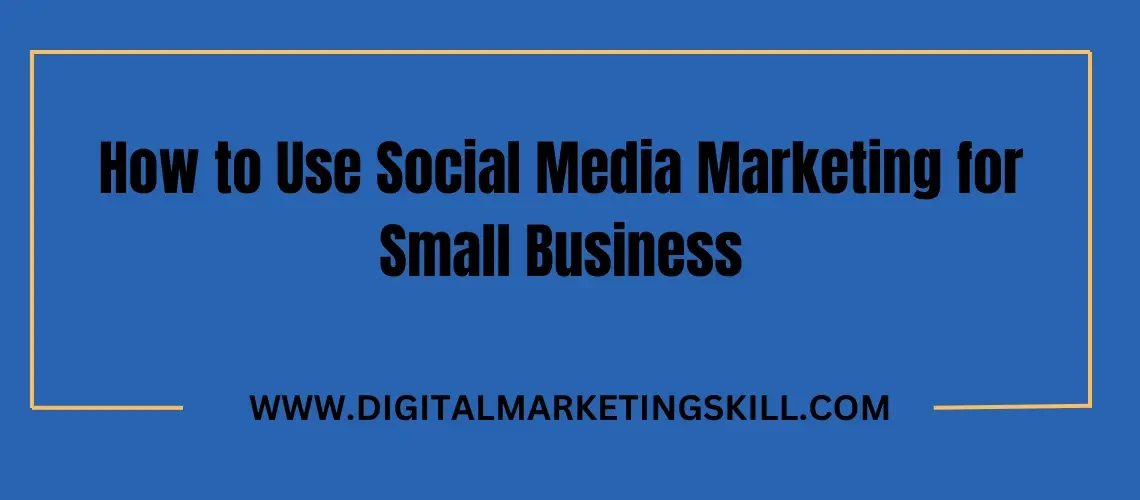As a small business owner, social media marketing may seem like a daunting task, but it’s an invaluable tool to reach and engage with your target customers. Having an effective social media presence is no longer just an option – it’s a necessity.
From connecting with your local community to promoting your products or services, social media platforms offer a cost-effective and powerful way to raise brand awareness, drive traffic to your website, and ultimately boost sales.
In this article, we’ll explore practical strategies and tips on how to effectively use social media marketing to take your small business to new heights.
Whether you’re just starting or looking to enhance your existing efforts, you’ll learn how to choose the right platforms, create compelling content, engage with your audience, and measure your success – all while staying true to your brand’s unique voice and values.
What is social media marketing?
Social media marketing is the use of social media platforms to connect with your audience, build your brand, increase sales, and drive website traffic. It involves publishing engaging content, interacting with followers, analyzing results, and running social media advertisements.
Social Media Marketing for Small Business

Social media marketing for small businesses refers to using social media platforms like Facebook, Instagram, Twitter, and LinkedIn to promote their products or services, connect with customers, and build brand awareness.
As a small business owner from Nigeria, social media marketing is a valuable tool that your business can benefit a lot from if properly used. Over 96% of small businesses use social media to enhance their marketing strategies. It offers benefits like increased sales, strong return on investment, improved customer relationships, and cost-effective marketing compared to traditional channels.
Although it demands time and a range of social media skills, but it presents a valuable opportunity for small businesses to interact with their customers.
Why use social media for your small business
Get 50% Discount to Master ALL Aspects of Digital Marketing That Can Earn You $2,500 - $5,000 a month (Even if you are a complete beginner!)
Our students that intentionally implement what they learn from our digital marketing course make back the entire course fee within a single month or more after completing our course because our course gives them many income generating options with unlimited earning potential with no age or location barrier. The best part is no technical skills are required.
An opportunity to change your lifestyle and make money working from anywhere in the world. The results our students get from our digital marketing course prove this could be applied to any market or country and that it is designed for any skill level and work background.
*By signing up, you agree to our privacy policy and terms of service.
Most businesses in Nigeria use social media because it offers a cost-effective strategy to increase brand awareness, reach your target audience, drive website traffic, generate leads, promote products and services, build a community, and connect with your customers.
This can be done by creating high-quality content that resonates with your audience for a fraction of the cost of traditional advertising and engaging with your customers in a more personalized and interactive way.
When you leverage social media for your small business, it can lead to growth, website visibility, and enhanced customer relationships, making it a powerful tool for your business to succeed nowadays.
Benefits of social media marketing for small business
Social media marketing offers several key benefits for small businesses:
1. Increased brand awareness and exposure
Social media provides a platform for small businesses to showcase their brand, products, and services to a larger audience. This can be done through content creation that customers can relate to and engage with regularly.
2. Cost-effective marketing
Traditional marketing methods like print ads, billboards, or television commercials can be expensive for small businesses with limited budgets. But for social media, it is less expensive and involves little capital to get started when your page is set up.
3. Targeted audience reach
Social platforms allow businesses to precisely identify and engage with their ideal customers, leading to more effective marketing efforts and better returns on investment. It also offers advanced targeting options that enable small businesses to reach specific demographics, interests, behaviors, and locations.
4. Improved customer relationships
Social media marketing fosters improved customer relationships by providing a direct channel for communication, feedback, and engagement. This leads to enhanced customer satisfaction, loyalty, and brand advocacy, ultimately contributing to the overall success of the business.
5. Increased website traffic and lead generation
When you share valuable content and include links to your website or online store, it can drive more traffic to your online presence and generate leads. This boosts visibility, expands the customer base, and enhances opportunities for conversions and business growth.
How to Create Social Media Marketing Strategy for Small Businesses

1. Define Your Goals
Establishing clear goals is the first crucial step in developing an effective social media marketing strategy for small businesses.
Start by identifying what you want to achieve through your social media efforts. Common objectives include increasing brand awareness, driving more traffic to your website, generating qualified leads, or directly boosting sales.
When you have identified these goals upfront, you can then tailor your social media activities to align with your specific targets.
This clarity helps you create content that resonates with your audience, select the most appropriate platforms to reach them, and measure the success of your campaigns.
Tracking your progress against these defined goals allows you to make data-driven decisions, optimize your strategy, and ensure your social media marketing is contributing to your overall business objectives.
Remember, your goals should be specific, measurable, and realistic to ensure you can effectively monitor and adjust your approach as needed.
2. Identify Your Target Audience
After setting your goal, start by defining who your ideal customers are if your business is based in Nigeria. This will help you tailor your content, messaging, and overall approach to resonate with the right people.
To identify your target audience, consider the following:
- Demographics: Age, gender, location, and occupation
- Interests: Hobbies, values, and lifestyle
- Pain points: Challenges and problems they face
- Goals: What they want to achieve
- Behaviors: How they interact with social media
You can also analyze your existing customer base and look for common traits. This data can provide valuable insights into the demographics and psychographics of your target audience.
Additionally, consider the specific products or services you offer and the problems they solve. This will help you determine the needs, pain points, and aspirations of your potential customers, allowing you to create content that speaks directly to their concerns and desires.
Once you have a clear picture of your target audience, you can then choose the most appropriate social media platforms where they are most active.
3. Choose the Right Platforms
With a lot of social media platforms available, it’s crucial for small businesses to carefully select the ones that align best with their target audience and marketing goals.
Conduct research to understand where your customers are most active and engaged, and prioritize those platforms in your strategy.
For example, if your business caters to a younger demographic, platforms like Instagram and TikTok may be more effective than LinkedIn. If you’re focused on building industry connections, LinkedIn could be a better fit.
When you choose the right social media channels, you can maximize your reach, engagement, and the overall impact of your marketing efforts. Remember, it’s not necessary to be present on every single platform.
Focus on the ones where your target audience is most active and where you can consistently create high-quality, valuable content.
This strategic approach will help you allocate your resources efficiently and achieve better results from your social media marketing.
4. Create a Content Calendar
A content calendar helps you plan, organize, and schedule your content in advance, ensuring consistency and efficiency in your posting schedule.
Creating a content calendar can help you visualize your content strategy, identify gaps and opportunities, and ensure that your content is aligned with your marketing goals.
It also helps you avoid last-minute scrambles for content and reduces the risk of posting irrelevant or duplicate content. A content calendar can include details such as the type of content, posting frequency, and specific dates for promotions or events.
It’s a flexible tool that can be adjusted as your strategy evolves, allowing you to stay agile and responsive to changes in your market or audience.
With a content calendar, you can maintain a strong social media presence, engage your audience, and drive meaningful results for your small business.
5. Produce Small Business Social Media Content
When creating engaging content, your content should captivate your target audience, provide value, and encourage interaction and sharing.
Start by developing a content plan that aligns with your business goals and resonates with your audience’s interests and pain points. Mix up different types of content, such as educational blog posts, visually appealing images or infographics, entertaining videos, and promotional updates about your products or services.
When producing content, focus on quality over quantity. Well-crafted, informative, and visually appealing content is more likely to capture attention and leave a lasting impression on your audience.
Use storytelling techniques, ask thought-provoking questions, and incorporate humour or relatable anecdotes to make your content more engaging.
It’s also essential to encourage user-generated content by running contests, polls, or prompting your audience to share their experiences or feedback. This not only fosters a sense of community but also provides valuable insights into your customers’ preferences and perceptions.
6. Collaborate and Partner With Other Businesses
Consider collaborating with influencers or thought leaders in your industry who have a strong social media presence and engaged following.
This can help your businesses to expand their reach and tap into new audiences on social media. They can help create sponsored content, reviews, or endorsements that introduce your products or services to their audience.
Additionally, seek out partnerships with other small businesses or brands that offer complementary products or services to your own. For instance, a fintech business can collaborate with a digital marketing institute to provide them with marketing talent for their business.
Cross-promotion through shared content, giveaways, or co-branded campaigns can mutually benefit both parties by introducing each other to new potential customers.
These collaborations and partnerships not only increase your visibility but also lend credibility and social proof to your brand.
7. Analyze and Adjust Your Social Media Results
Regularly analyzing your social media performance is essential for small businesses. You should monitor some metrics like engagement, reach, click-through rates, and conversions to understand what’s working and what’s not.
Use this data to make informed decisions and adjust your strategy accordingly to determine what part of the plan needs adjustment. Experiment with different content types, posting times, and messaging to see what resonates best with your audience.
By continuously analyzing your results and making adjustments based on insights, you can optimize your social media marketing efforts, improve performance, and achieve better outcomes for your small business.
The Best Social Media Marketing Platforms

When it comes to social media marketing for small businesses in Nigeria, choosing the right platforms is crucial for maximizing your reach and effectively engaging with your target audience.
While there are numerous social media platforms available, some stand out as particularly well-suited for small businesses.
With a large user base and robust targeting options, Facebook is an excellent choice for small businesses looking to build brand awareness, drive website traffic, and connect with local customers.
The platform’s advertising tools, such as boosted posts and Facebook Ads, allow small businesses to reach highly specific audiences within their budget.
To start using Facebook for your small business, ask yourself some of these questions listed:
- Why choose Facebook for my business?
- Are my customers actively using Facebook?
- Are similar businesses/competitors on Facebook?
- Do I have the time to manage my Facebook page properly?
- Why is Facebook marketing effective?
These questions are essential to consider before utilizing Facebook as a marketing tool for your small business.
Owned by Meta (Facebook’s parent company), Instagram is a highly visual platform that’s particularly effective for product-based businesses, creative industries, and lifestyle brands.
It is a video-creating platform that allows businesses to showcase their services and products to their audience through video posting, Instagram stories and reels, share behind-the-scenes glimpses and connect with their audience through visually appealing content.
The vast majority of users are between 18 and 34. So, if your target audience uses the platform, you may want to focus your energy here and share content they might be interested in to patronise your small businesses.
Twitter is a great platform for small businesses because it offers a direct channel to engage with customers, develop leads, and raise awareness about their brand. With its wide reach and interactive features, Twitter can be a valuable tool for businesses looking to enhance their online presence and connect with their target audience effectively.
Twitter’s real-time nature and character-limited posts make it an ideal platform for small businesses to engage in conversations, share updates, and provide customer support. By leveraging relevant hashtags and participating in industry discussions, small businesses can increase their visibility and establish themselves as knowledgeable and responsive brands.
For small businesses operating in the B2B space or offering professional services, LinkedIn is an invaluable platform. It allows businesses to showcase their expertise through thought leadership content, participate in industry discussions, and connect with potential clients and partners.
LinkedIn’s focus on professional networking and business-related content makes it an ideal platform for businesses looking to establish credibility, expand their network, and professionally drive growth.
Youtube
YouTube is one of the best social media platforms for small businesses to leverage. It provides a powerful visual medium to engage audiences through informative videos, product demonstrations, and entertaining content.
YouTube allows businesses to effectively showcase their expertise, promote offerings, and build brand awareness with a wide user base. The video-centric nature of the platform makes it an excellent choice for reaching and engaging customers.
The ability to create in-depth, informative video content on YouTube can help small businesses build trust and credibility with their audience, leading to more conversions and sales.
If your small business operates in sectors such as home decor, fashion, food, or travel, Pinterest can be a powerful visual marketing tool. Its users often use the platform for inspiration and discovery, making it an excellent platform for showcasing products and driving traffic to your website.
While these platforms are among the best for small business social media marketing, it’s important to consider your target audience, marketing goals, and the types of content you plan to create.
Top social media tips for small businesses
It’s crucial to stay informed about the latest trends and developments in social media marketing. This will help you stay ahead of the curve, identify new opportunities, and adapt your strategy to maximize your online presence and engagement.
1. Be Consistent
Post high-quality content regularly, at least once a week, to build a consistent presence and grow your audience over time.
2. Diversify Your Content
Experiment with different content formats like photos, videos, polls, and user-generated content to see what resonates best with your audience.
3. Focus on Quality Over Quantity
It’s better to post less frequently but ensure each piece of content is valuable and engaging, rather than overwhelming your audience with too much content.
4. Find and Leverage Trends
Monitor emerging social media trends and consider how you can incorporate them into your strategy, such as trying out new features or formats that are gaining popularity.
5. Stay Authentic
Maintain a consistent brand voice and personality across your social media channels to build trust and connection with your audience.
Social Media Management Tools for Small Business

The social media management tools recommended for small businesses include
- HubSpot
- Hootsuite
- Sprout Social
- Buffer
- Zoho Social
- CoSchedule, and others.
These tools offer features like scheduling posts, monitoring engagement, analyzing performance, and providing valuable insights to streamline social media marketing efforts for small businesses.
Social media marketing courses
At Digital Marketing Skills Institute, we offer comprehensive social media marketing courses designed specifically for small businesses. Our courses equip you with the skills to develop effective strategies, create engaging content, leverage various platforms, and measure your success in reaching and converting your target audience through social media marketing.
I am going to stop here, if you want more innovative ways to use social media marketing for your small business and customers online, do check out our digital marketing course page, to know how you can acquire the right marketing strategies to grow your customer base.
Final Thought
Social media marketing has become an essential tool for small businesses to thrive and reach new heights. By leveraging the power of platforms like Facebook, Instagram, and LinkedIn, small businesses can amplify their brand, connect with their target audience, and drive tangible results.
When you embrace social media marketing, it can open up a world of opportunities for small businesses, from boosting brand awareness and generating leads to driving website traffic and increasing sales.
FAQs
How are small businesses using social media?
Small businesses are using social media to:
- Build brand awareness and increase visibility
- Engage with their target audience and foster customer relationships
- Drive website traffic and generate leads
- Promote their products and services
- Gather customer feedback and insights
- Stay up-to-date with industry trends and competitors
What is the best way to use social media for small business?
The best way for small businesses to use social media is to:
- Define clear goals and objectives
- Identify their target audience and where they are most active
- Create a content strategy focused on providing value to followers
- Post consistently and engage with their community
- Leverage both organic and paid strategies to amplify their reach
- Analyze performance data to continually optimize their approach
More Resources
5 Social Media Mistakes You Need to Know About
Effective Social Media Campaign Strategies For Small Businesses
Social media marketing: What it is and how to build your strategy
Social Media Marketing Training Course in Nigeria
15 Social Media Marketing Tools For Nigerian Online Marketers


